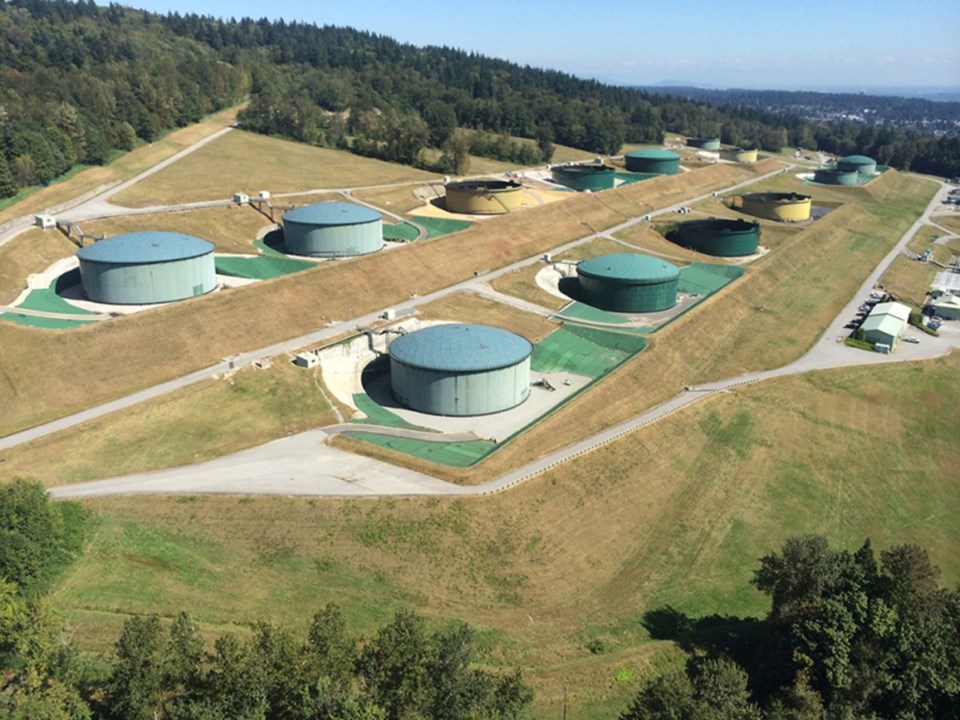We can create billions of dollars in land value, protect the local environment and make Burnaby residents safer all at once.
Thatâs Liberal MP Terry Beechâs big idea: upzone Burnaby Mountain for high-density residential and move the Trans Mountain pipeline tank farm somewhere else.
He says it could be a âwin-win-winâ solution for everyone â it would alleviate the fears of a catastrophic fire on the mountain, make a huge windfall sale for the federal government and create new housing units in a region that desperately needs them.
The Burnaby NorthâSeymour member of Parliament said the idea first came to him when he toured the site more than two years ago.
âUnless you get up there and look around, you donât realize what a large parcel of land it is, and I couldnât help but think, âIf this was developed into real estate, it would be one of the most valuable properties in North America,ââ he said.
The proposal is one of six in a âdiscussion paperâ written by Beech to Prime Minister Justin Trudeau and fellow Liberal caucus members.
The ideas are not sanctioned by Trudeau or cabinet, but serve as a launching point for âaddressing the impact of the Trans Mountain expansion,â Beech wrote.
He said the proposal became more viable when the federal government finalized its purchase of the existing pipeline and the expansion project in August, including the 13-tank site.
Beech short on details, but confident in idea
Beech said he has raised the question with the CEO of Kinder Morgan Canada and Burnaby Mayor Derek Corrigan, but has not consulted experts on the feasibility of such an undertaking.
He said he doesnât know where the tank farm would go, how much it would cost to remediate the industrial site or how long it would take.
âIâm short more information than I have, admittedly,â he said.
Beech cited his past career as a real estate developer in saying heâs confident the land would be worth billions.

The views of Vancouver, Burrard Inlet and the United States âwould be just unbelievable,â he said. âSo I think that the math could work.â
But no one else the ±·°¿°ÂÌýspoke to for this story shared Beechâs optimism.
Remediation time and cost unclear
The proposal would ultimately require the City of Burnaby to rezone the area from industrial to high-density residential, but Mayor Derek Corrigan said the only discussion heâs had with Beech about it lasted about 15 seconds at a public event.
âI wouldnât even hazard a guess as to an order of magnitude number in order to do something like that,â Corrigan said, referring to the cost of the wholesale removal and development of the site.
Corrigan was also critical of Beechâs decision to go public with the idea when there is no indication the federal cabinet is actually behind it.
âRight now, the last weâve heard from the Prime Minister is heâs rushing the project through to try to complete it in six months,â Corrigan said. âSo it doesnât add much credibility to Terry Beech making these kinds of proposals.â
Corriganâs challenger in this Saturdayâs election, Mike Hurley, said he was broadly open to the idea, but he also questioned its feasibility.
âI donât know how realistic it is but anything that would remove the tank farm from Burnaby Mountain would be good,â he said.
Andy Yan, housing expert and director of Simon Fraser Universityâs City Program, said he was âflabbergastedâ by the idea when he first heard of it from the NOW.
In addition to the issues around finding a new tank farm location, land remediation and city infrastructure, Yan pointed out the federal government would need to go through a First Nations review before it sold the land.
That is just one among a litany of questions Beech has no answers to, Yan said.
âWhen you start getting into the weeds and getting into the details, thatâs where it gets messy,â he said.
Â鶹´«Ã½Ó³»architect and planner Michael Geller echoed many of the same concerns.
Geller, Corrigan and Yan all independently cited the land north of False Creek in Â鶹´«Ã½Ó³»as an example of the costly and difficult task that is remediating and developing former industrial land.
Geller said the Expo land effort cost hundreds of millions of dollars and the bill could be similar on Burnaby Mountain.
âI think it would naive to assume that there has never been a spill or that there is no contamination of that [Burnaby Mountain] land,â Geller said.
But even if the land were suddenly clear of the oil tanks, it shouldnât necessarily be turned into gleaming condo towers, Geller said.
The plan for Burnaby Mountain has been to densify within SFUâs ring road (including UniverCity, which Geller developed), while conserving the rest, he said.
'It seems like a fantasy'
A local anti-pipeline activist was also skeptical of the idea. Karl Perrin, who lives in nearby UniverCity, said Beechâs proposal âseems like a fantasy.â
Perrin said he will be watching to see whether Beech is âjust floating an idea and hoping that people vote for him.â Â
Trans Mountain, now a Crown corporation, did not respond to specific questions about the viability and cost of moving the tank farm, but a spokesperson did email a statement: âTrans Mountainâs Burnaby and Westridge Terminals have been in their current locations since the 1950s. Our future expansion and operational plans are all based on the existing locations and we have no plans to relocate our terminals.
But Beech defended his choice to make his idea public.
He said he hopes it sparks a conversation about creative solutions to impacts of the pipeline and its planned expansion.
âMaybe itâs a 20 year solution but, I still think itâs something thatâs worth talking about and getting to the bottom of whether itâs viable,â he said.
âI think itâs absolutely a realistic proposal.â



